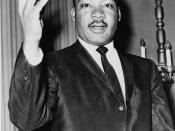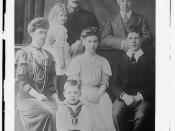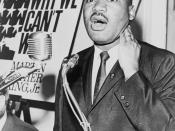In 1963, Martin Luther King, Jr. wrote his ?Letter from Birmingham Jail?, where his use of rhetorical devices such as hypophora, ad hominum, and allusions revolutionized the common thoughts and attitudes that people had towards African-Americans in the mid-1900?s. King?s rhetorical devices displayed much pathos, ethos and logos which effectively helped King strengthen and support his ideas by appealing to many different audiences including eight white clergymen, and secondary, the people of Birmingham. King begins his letter with, ?My Dear Fellow Clergymen?, which reflects his attempt to address his audience with respect. King, also being a clergyman, is able to relate to his immediate audience within the basis of religion and use it as a common ground when presenting his arguments.
One of the rhetorical devices that King uses in his arguments is hypophora, defined as raising a question then answering the question in the paragraph to follow.
This is used to provide additional background information for his letter as well as his explanation for the use of direct action. King asks, ?Why direct action? Why sit-ins, marches, and so forth? Isn?t negotiation a better path?? (184). By beginning his argument with these questions, King immediately puts his ideas and thoughts into his audiences mind and forces them to ask themselves what they truly think is the right answer. After asking these questions, King replies with his answer, ?Nonviolent direct action seeks to create such a crisis and foster such a tension that a community which has constantly refused to negotiate is forced to confront the issue? (184). In answering his own question, King gives his reasoning for his actions, and gives evidence to his audience that the reason they are not acting is to preemptively stop tension between the whites and African-Americans. The strength of this rhetorical device is that it provides two different messages; first, when King writes the questions in the beginning of his letter, he is directly asking his immediate audience and focuses their mindset on what they have experienced to be right. Secondly, by answering his own question, he is able to show his audience what is wrong with what they are thinking about and why matters must change.
Another effective rhetorical device that King uses is ad hominum, taking other members of authority and making an example of them which allows his immediate audience to see the unjust intentions that the people who oppose King have. King says, ?In this sense [the police] have conducted themselves rather ?nonviolently? in public . . . Perhaps Mr. Connor and his policemen have been rather nonviolent in public, as was Chief Pritchett in Albany, Georgia, but they have used the moral means of nonviolence to maintain the immoral end of racial injustice? (196). By using factual events, he is able to strengthen his argument by showing the clergymen the irrational deeds that are being performed out on the streets of Birmingham. The ad hominum possesses much strength in that it weakens the opposition?s argument by using direct examples of their mistakes and allows King the opportunity to show his audience how to change the mistakes that have been made by their authority figures.
One of King?s most used rhetorical devices is his allusions, many relating to notable people, and others that explain historical events, each of which King points out how we can learn from our past mistakes. In King?s letter, he uses a various array of allusions from Jesus Christ to Elijah Muhammad to Socrates, each of which supports King?s ideas for a nation that is prejudice free. Yet one of the most important allusions King makes is his reference to Hitler, ?We should never forget that everything Adolf Hitler did in Germany was ?legal? and everything the Hungarian freedom fighters did in Hungary was ?illegal.? It was ?illegal? to aid and comfort a Jew in Hitler's Germany? (188). By writing on this topic, King does many things for his argument; first, he speaks of a man whose deeds were so bad and malicious that no man, especially clergymen, could defend his doings. King also proves a point by stating that what Hitler did was ?legal?, this shows King?s audience that there is always a moral right and a regulatory right, it is just a matter of conscience to choose which one is the true right. Second, he displays a horrible event that affected religion and white people the most, which allows his argument to hit on a more personal level with the clergy men he is writing to. Lastly, King reminds his audience that it was ?illegal? to help the Jewish, saying that it was against the law to do the right thing. By trying to save peoples lives, you were breaking the law. For these reasons, we see how powerful one phrase can be, to be able to take a bad historical event and relate it to a present day situation to prove to your audience that things must change are in itself one of the most persuasive forms of argument. These allusions portray a great deal of appeals. First, by taking a situation where many innocent people died for an unjust reason, King displays pathetic appeal; then King uses logos by explaining the logic on how some things in this world can be seen as ?legal?, but in the end, when making decisions, are they morally right or wrong? In conclusion, King?s ability to argue a point and then use rhetorical devices to support and strengthen his views is his advantage when making this argument to the clergymen. Without the use of rhetoric, King?s letter would not have held the power to move a nation and change the way that we treat people today. His rhetorical devices are the backbone of argument and with his use of authoritative and religious figures that were known to make mistakes in the past, King is able to solidify his points that change must occur and is always necessary. Despite his powerful and stern message, it is King?s ability to maintain his composure and politeness which allows this letter to carry such a powerful meaning and strong message.
Works Cited King, Martin Luther Jr. ?Letter from Birmingham Jail.? A World of Ideas: Essential Readings for College Writers. 6th ed. Ed. Lee A. Jacobus. Boston: Bedford St.
Martin?s. 2002. 181-197 Roberts, Davis. ?Robert?s Rhetoric.? http://asuweb.asurams.edu/english/Roberts/book/ch07.htm Mercer, Tiffany L. ?King?s Crusade? http://personal.centenary.edu/~tlivings/Kingquestions.htm




![King [Haakon] and Queen [Maud] of Norway and [Crown] Prince Olaf (LOC)](https://s.writework.com/uploads/11/119823/king-haakon-and-queen-maud-norway-and-crown-prince-olaf-loc-thumb.jpg)
